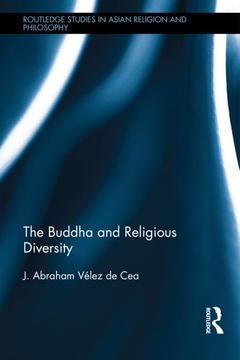The Buddha and Religious Diversity Routledge Studies in Asian Religion and Philosophy Series
Auteur : Velez de Cea J. Abraham

Providing a rigorous analysis of Buddhist ways of understanding religious diversity, this book develops a new foundation for cross-cultural understanding of religious diversity in our time.
Examining the complexity and uniqueness of Buddha?s approach to religious pluralism using four main categories ? namely exclusivism, inclusivism, pluralistic-inclusivism and pluralism ? the book proposes a cross-cultural and interreligious interpretation of each category, thus avoiding the accusation of intellectual colonialism. The key argument is that, unlike the Buddha, most Buddhist traditions today, including Therav?da Buddhism and even the Dalai Lama, consider liberation and the highest stages of spiritual development exclusive to Buddhism. The book suggests that the Buddha rejects many doctrines and practices found in other traditions, and that, for him, there are nonnegotiable ethical and doctrinal standards that correspond to the Dharma. This argument is controversial and likely to ignite a debate among Buddhists from different traditions, especially between conservative and progressive Buddhists.
The book fruitfully contributes to the literature on inter-religious dialogue, and is of use to students and scholars of Asian Studies, World Religion and Eastern Philosophy.
Introduction Part 1: A Cross-Cultural and Interreligious Interpretation of the Typology Exclusivism-Inclusivism-Pluralism 1. A New Framework 2. Pluralism and Degrees of Openness Part 2: Exclusivism 3. Clarifying the Concept of Exclusivism 4. Is There Liberation outside Buddhism? Part 3: Inclusivism 5. Retrieving the Early Buddhist Position 6. Are Buddhists Inclusivists or Exclusivists with Inclusivist Attitudes? Part 4: Pluralistic-Inclusivism 7. From Inclusivism to Pluralistic-Inclusivism 8. Beyond Buddhist Inclusivism Part 5: Pluralism 9. Was the Buddha a Pluralist? 10. Applying John Hick’s Model of Pluralism to the Pāli Nikāyas? Part 6: Starting a Dialogue between the Buddha and other Models of Religious Diversity 11. A Comparative Appraisal of Hick, Heim, and the Buddha
J. Abraham Vélez de Cea is Associate Professor in the Department of Philosophy and Religion at Eastern Kentucky University, USA.
Date de parution : 12-2012
15.6x23.4 cm
Disponible chez l'éditeur (délai d'approvisionnement : 14 jours).
Prix indicatif 172,36 €
Ajouter au panierDate de parution : 05-2017
15.6x23.4 cm
Disponible chez l'éditeur (délai d'approvisionnement : 14 jours).
Prix indicatif 53,83 €
Ajouter au panierMots-clés :
doctrinal; claims; view; raimon; panikkar; races; typology; transcendent; reality; Liberated Beings; dependent; Noble Eightfold Path; Hick's Pluralist Hypothesis; Exclusivist View; non-Buddhist Traditions; Bhikkhu Bodhi; Dependent Origination; Exclusivist Interpretations; Specific Conditionality; Ordinary Inclusivism; Doctrinal Claims; Noble Truths; Religious Diversity; Buddhist Inclusivism; Buddha's Advice; Buddha's Teachings; Buddha Gotama; Multiple Salvations; Vice Versa; White Logic; Undetermined Questions; Elephant's Footprint; Exclusivistic Attitudes; Pluralist View; non-Buddhist Schools



